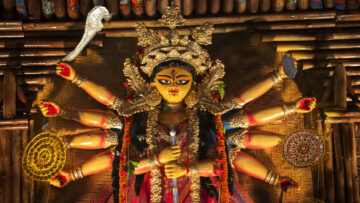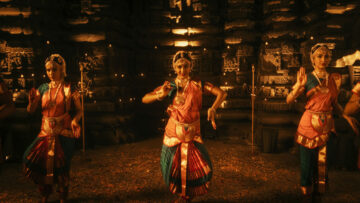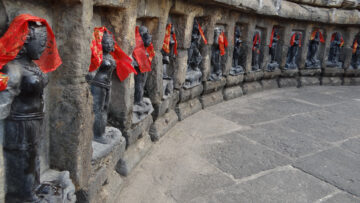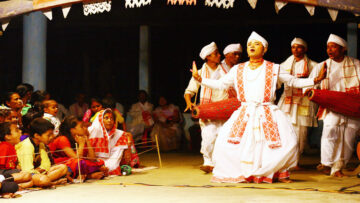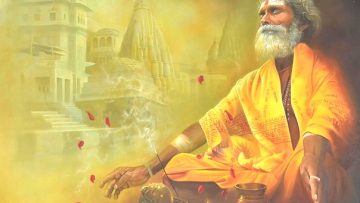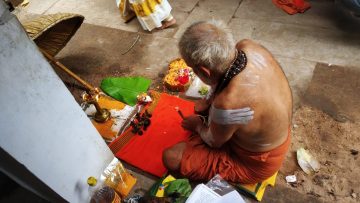Introduction
Kashmir has been a seat of traditional learning for centuries. It is no wonder that it continues even now, although to a lesser extent due to various factors. Thus, in Zinda Kaul (1884-1965), we have a modern poet who has imbibed the teachings of the Vedanta. Zinda Kaul was a poet, writer and a teacher. He composed in Persian, Hindi, Urdu and Kashmiri. Kaul also translated works of Kashmiri into English, Persian and Hindi. He was affectionately called as ‘masterji’ by his students. He belonged to Srinagar area. He was born in a Pandit family and he took to teaching (in a school) from his early days. Kaul had a passion for poetry. His collection of poems, ‘Sumran’ won the Sahitya Academy award in 1956. In fact, he was the first Kashmirian to win this coveted honour.
The Supreme Being
The scripture says:
om atma va idameka evagra asinnanyatki.nchana mishat.h . sa ikshata
lokannu srija iti .. 1..(Aitareye, 1.1.1)
In the beginning all this verily was Atman (Absolute Self) only, one and without a second. There was nothing else that winked. He (Atman) willed Himself: “Let Me now create the worlds.”
so ‘kāmayata . bahu syāṃ prajāyeyeti [Tait. Up. – 2.6]
(He desired. “May I be many, may I grow forth”)
sa tapastaptvā mithunamutpādayate rayiṃca prāṇaṃceti etau me bahudhā prajāḥ kariṣyata iti [Prsn. Up. – 1.4]
(After getting heated by austerity He produced a pair, matter and life, thinking, “These two will create many beings for Me”)
tasmādvā etasmādātmana ākāśaḥ saṃbhūtaḥ ākāśādvāyuḥ vāayoragniḥ agnerāpaḥ adabhyaḥ pṛthivī pṛthivyā oṣadhayaḥ oṣadhībhyonnam annātpuruṣaḥ [Tait. Up. – 2.1]
(Verily from this Self arose the space; from space air, from air fire, from fire water, from water earth, from earth minerals, from minerals vegetation and from vegetation man.)
We have the sense of being outside everyday reality. We feel supreme joy when we do what we love. The Upanishad says, “having performed penance, he [Bhrigu] understood that perfect bliss was Brahman. For it is from that bliss that these beings are born.” (Taittiriya Upanishad 3.6.1).
Putting the same idea in a different format, Kaul says that the Brahman manifests himself for amusement.
तजपननेदेशद्रामुत
योरआमुतगिन्दने
नचनसज्ञनमोरआमुत
योरआमुतगिन्दने
(“The king (Atman) has his own will. Descended from the plane of pure spirit he has come here to amuse himself to his joy like a dancing peacock.”)
The concept of God’s incarnations is alluded to in this stanza. The illustration given is very appropriate. The peacock dances of its own accord. Nobody can compel it to dance. Dancing is an expression of joy. When the Paramatman descends to the earth, it is out of his own will. It is his ‘leela’ or divine pastime. God is of the form of Supreme Joy as expressed in the Upanishads.
आनन्दोब्रह्मेतिव्यजानात्।आनन्दाध्येवखल्विमानि
भूतानिजायन्ते।आनन्देनजातानिजीवन्ति।
आनन्दंप्रयन्त्यभिसंविशन्तीति।
सैषाभार्गवीवारुणीविद्या।परमेव्योमन्प्रतिष्ठिता।
सयएवंवेदप्रतितिष्ठति।अन्नवानन्नादोभवति।
महान्भवतिप्रजयापशुभिर्ब्रह्मवर्चसेन।
महान्कीर्त्या॥१॥(Taittiriya, Anuvaka 6)
(“Bhrgu understood that Bliss is Brahman; because it is from Bliss that all these beings are produced and by bliss do these beings live. They go to bliss on departing and become one with it. Having known that he approached his father again saying: ‘Revered Sir, instruct me about Brahman.’ Varuna told him: ‘Desire to know Brahman by Tapas. Tapas is Brahman.’ He performed Tapas and having performed Tapaa he attained the bliss”)
The nature of Self is ever-blissful, yet we feel constant pains and sufferings in the world. Each one of us is forced to face the worldly happenings in every station of our life. These sufferings cannot end without going to their root cause and finding a solution for it. The cause of these sufferings, as put by most of the schools of Indian Philosophy, is ignorance about the nature of Self that results in bondage. All the schools of Indian Philosophy, except the Cārvāka, hold that ignorance is the cause of bondage and knowledge begets liberation. Realization of eternal peace or bliss is the goal of almost every school of Indian Philosophy. Here, we must know that Ānanda is of three types—Viṣayānanda, Vidyānanda and Brahmānanda. Viṣayānanda is momentary pleasure, which arises out of the contact of the mind with external objects. It has a difference in degrees. Vidyānanda is the pleasure that we derive from the feeling that “I have achieved all that was to be achieved”. It is still of the form of a mental mode. Brahmānanda is eternal bliss, which is discovered when avidyā is annihilated by akhandākāra mental mode. It is beyond mind and its modifications. The views of the Bhagavadgītā, Upaniṣad, and the elementary texts written by the proponents of the philosophy of non-dualism expound that the way to achieve the state of bliss is by inculcating the attitude of absolute detachment which, when achieved, makes a short work of our ignorance about Brahman.
In another place Kaul says,
Desh rust aamit su paanay
…….jan javaahir yor aamut.
‘The Lord is beyond space yet he accepts limitation of space. So has our gem (javahir/ Jawaharlal Nehru) has, of his own accord, accepted imprisonment and arrest for the sake of his country.’ Being a Kashmirian, it is but natural for Kaul to praise Jawaharlal Nehru who also hailed from Kashmir.
The poet has combined philosophy with his national spirit.
Concept of Guru
The concept of guru has a pre-eminent place in Indian context. The disciple will be prepared to do anything for the sake of the guru. Kaul says,
Gat pachay chandar jan naam roop
Ak ak kalaa vigalaavasay
(“Just as the moon in the dark fortnight loses its digit bit by bit, so will I give away all I have, name and form for the sake of the guru.”)
The poet further says,
Pujay vidha keha jaan maa
Lochan nivaadh keha maan maa
Chayayi churi kuni myuthaa divan
Lut tat khuras vo aasahaa
(“I do not know the rules of worship, nor believe that anything can hinder pure love. I might stealthily and silently imprint a soft kiss on the holy feet of the guru.”)
The concept of ‘guru’, preceptor, is very important to Indian tradition. All schools of philosophy accord an exalted place to the preceptor in the scheme of things.
The word ‘guru’ is derived from the root ‘gṛ’ (vijñāne) to teach or from ‘gṛṇāti’ (upadiśati) to instruct or from ‘gīryate’ (stūyate) being praised. The primary duty of a Guru is to teach. But he does not stop with that. He instructs the students into the right path. For this reason he is praised by all. There is a verse that brings out the efficacy of the term Guru.
guśabdastvandhkāraḥ ruśabdastannivārakaḥ
andhakāranirodhitvāt gururityabhidhīyate
(“The letter ‘gu’ stands for darkness, ‘ru’ stands for dispelling of that. Therefore, the term ‘guru’ signifies dispelling of the darkness of ignorance.”)
That is what a teacher is.
A true Guru must have two qualifications. He should possess the theoretical knowledge of the scriptures. Then he must have realized that knowledge himself. The Guru must have attained God-realization. Only the person who has attained to God can help others to attain Him. A beggar cannot be expected to help others with money. If the Guru has no knowledge of Divinity how can he teach others about it? Hence a Guru who has attained God is a True Guru, and such a Spiritual Master is called ‘Sadguru’ or One who is placed in the seat of Truth.
There is another stanza that treats the word Guru as an algebraic formula.
gakāraḥ siddhidaḥ prokto rephaḥ pāpasya hārakaḥ
ukāro viṣṇu-ravyaktaḥ tritayātmā guruḥ paraḥ
(“The letter ‘g’ stands for the giver of success, ‘r’ signifies the dispeller of sin and the letter ‘u’ stands for Lord Viṣṇu.”)
The additional information that we get from this stanza is that the Guru is equivalent to Lord Viṣṇu. We already have a popular stanza “gururbrhmā gururviṣṇuḥ…”
Manu says, (2.142) – The teacher, the father, the elder brother, the king, maternal uncle, paternal uncle, father-in-law, the protector, maternal grandfather, paternal grandfather, an elderly relative – all these are called gurus’.
One of the conventional stanzas attaches religious significance for the term guru.
niṣekādīni karmāṇi yaḥ karoti yathāvidhi
saṁbhāvayati cānnena sa vipro gururucyate
(“Guru is one who performs all the rituals according to the prescribed rules and also distributes food.”)
We have to understand that a Guru not only performs the rituals himself but also he makes others perform them. Thus a family priest may be called a Guru. He also feeds others at the conclusion of rituals, that is, when he himself performs them. Or it means that he feeds his students. In the age old Gurukula pattern of education, the student used to live in the house of the Guru and serve him. The Guru, in turn, would feed him and educate him.
Śrī Śaṅkarācārya pays glorious tributes to Guru.
akhaṇḍmaṇḍalākāraṁ vyāptaṁ yena carācaram
tatpadaṁ darśitaṁ yena tasmai śrī gurave namaḥ
(“Salutations to that Guru who revealed that Truth, which is unfragmented, infinite, timeless divinity and which pervades the entire universe – movable or unmovable.”)
ajñānatimirāndhasya jñānāñjanaśalākayā
cakṣurunmīlitaṁ yena tasmai śrī gurave namaḥ
(“Salutations to that reverential teacher, who opened the eyes, by applying the divine collyrium of self-knowledge into the eyes, which had got blinded by the cataract of ignorance.”)
jñānaśaktisamārūḍhaḥ tattvamālāvibhūṣitaḥ
bhuktimuktipradātā ca tasmai śrī gurave namaḥ
(“Salutations to that glorious Guru, who is established in Knowledge and Power, who is adorned with the garland-of real truth and who grants both worldly prosperity and spiritual liberation.”)
Maharajji goes one step further. He says there is no use of bhukti and mukti. Only bhakti is important which the Guru gives. Only Guru seva is important
Nita seva mangu shyama shyama teri ; na bhukti naahim mukti mangu me
na guroradhikaṁ tattvaṁ na guroradhikaṁ tapaḥ
tattvajñānāt paraṁ nāsti tasmai śrī gurave namaḥ
(“There is no higher truth than the(service to) the Guru, and there is nothing higher than Realisation of the Knowledge of the truth imparted by the Guru. Salutations to such a Guru, who is himself that very timeless truth (and who has taken up a form to bless his disciples with real knowledge).”
mannāthaḥ śrījagannāthaḥ madguruḥ śrījagadguruḥ
madātmā sarvabhūtātmā tasmai śrī gurave namaḥ
(“My Lord is the Lord of Universe; My teacher is the teacher of the entire universe; and my Self is the Self of all. Salutations at the lotus-feet of such a Guru, who has revealed such a knowledge.”)
Karma Yoga
The religious duties have to be performed by a devotee without expecting any personal gains. This is the essence of Karma Yoga. Kaul says that the man who performs religious duties and desires for paradise or mansions as reward is like one who having built a mosque first, demolishes it and builds a shop in that place.
Vairagya
One has to develop the sense of vairagya with respect to the worldly things and accept them as inevitable. One should, on the other hand, has to cultivate the desire to attain the Ultimate Liberation and hope for it. Reflecting this idea in one of his poems, Kaul says – Time cannot go backwards. Summer after autumn is not possible. The winter of cessation cannot be avoided. Since it has to come, I want it to come sooner. We can compare this statement with the Bhagavadgita verse,
मात्रास्पर्शास्तुकौन्तेयशीतोष्णसुखदु:खदा: |
आगमापायिनोऽनित्यास्तांस्तितिक्षस्वभारत|| 2.14||
(“O son of Kunti, the contact between the senses and the sense objects gives rise to fleeting perceptions of happiness and distress. These are non-permanent, and come and go like the winter and summer seasons. O descendent of Bharat, one must learn to tolerate them without being disturbed.”)
The human body houses five senses—the senses of sight, smell, taste, touch, and hearing—and these, in contact with their objects of perception, give rise to sensations of happiness and distress. None of these sensations is permanent. They come and go like the changing seasons. Although cool water provides pleasure in the summer, the same water gives distress in the winter. Thus, both the perceptions of happiness and distress experienced through the senses are transitory. If we permit ourselves to be affected by them, we will sway like a pendulum from side to side. A person of discrimination should practice to tolerate both the feelings of happiness and distress without being disturbed by them.
The technique of Vipassanā, which is the primary technique of self-realization in Buddhism, is based on this principle of tolerance of sense perceptions. Its practice helps eliminate desire, which, as stated in the four noble truths (the truth of suffering, the truth of the origin of suffering, the truth of the cessation of suffering, and the truth of the path leading to the cessation), is the cause of all suffering. This is not surprising considering that Buddhist philosophy is a subset of the vast Vedic philosophy.
Kaul has given a modified account of the same idea in his work. Thus, we find in Zinda Kaul a combination of modernity and ancient wisdom, sophistication as well as traditional simplicity, philosophy as well as patriotic spirit.
The legacy of Zinda Kaul
We find an unmistakable influence of Zinda Kaul on later Kashimiri poets. Some of them may be listed below.
Sarwanand Koul Premi, (2 November 1924 – 1 May 1990), was a Kashmiri poet, journalist, research scholar, Gandhian, social reformer and independence activist living in Jammu & Kashmir, India. He brought out works like Bhakti Kusum, Mathr Devi and Rupa Bhavani. He also translated the Bhagavad Gita into Kashmiri language in the verse form. In one of his poems, he says,
Lolas byol gali, titi ma bani zanh,
Zoon payi chali chali, titi ma bani zanh;
Apuz kenh kaal yodvy rathi khasi,
Pazras nyal gali, titi ma bani zanh.
(It will never be, that love will be lost,
it will never be, that moon will shattered;
Lie can prevail for a moment,
it will never be, that truth will vanquish.)
On the fateful day of 29th April 1990, Sarwanand Koul Premi along with his son were martyred by unknown gunmen in his native village itself, but the songs of Premi which are full of compassion, brotherhood and patriotism will echo in our ears forever, reminding us of the great human being he was.
A fearless soldier of pen, Premi was never afraid of his stand on brotherhood and patriotism he stood for all through his life. He wrote,
Be aashan hanz aash banith
bas lat monji gos.
Cheti ma amut yuth toofanah
myani pathi
(Being a hope of the hopeless
I am being trampled upon;
Are you also facing this typhoon
like me)
Abdur Rehman Rahi (born 6 May 1925, Srinagar) is a Kashmiri poet, translator and critic. He was awarded the Indian Sahitya Akademi Award in 1961 for his poetry collection Nawroz-i-Saba, the Padma Shri in 2000, and India’s highest literary award, the Jnanpith Award (for the year 2004) in 2007. He is the first Kashmiri writer to be awarded the Jnanpith, India’s highest literary award for his poetic collection Siyah Rood Jaeren Manz (In Black Drizzle). He was honored with Sahitya Akademi Fellowship in 2000 by Sahitya Akademi, New Delhi. In his poem, Shadows, he says,
All Gods are mine own shadows
All monsters like my animated self
Rahi is a fire eating lunatic
The book of Genesis tells us that God created man in His own image, forming man from the dust of the earth and breathing into his nostrils the breath of life (Genesis 1:26-27; 2:7). The fact that God made man in his image and likeness delineates the most fundamental difference between humans and other creatures. All other distinguishing characteristics between man and the animal world fall within its broad spectrum.
The image of God imparts special meaning, harmony, intelligence and design to human life. To be human is to be created in the image of God.
Three scriptures in the book of Genesis refer to our being created in the image of God (Genesis 1:26-27; 9:6). As we will see, they show that the ‘image of God’ is of crucial importance to the grand purpose of humanity on planet earth. They are not just statements of historical fact; they point directly to mankind’s awesome destiny.
The Advaita says, ‘jivao brahmaiva naaparah.’
This sutra means that ‘every jiva – the apparent limited & finite entity is basically the infinite and limitless Brahman, and nothing else. The truth and essence of an individual is the truth and essence of this whole world or rather God. Every Jiva is basically God himself wearing a cloak of limited equipments, and moreover, identified with ones equipment he lives a limited and transient life. It is basically a case of non-apprehension followed by mis-apprehension of the truth of oneself. We take ourselves to be limited and therefore we are and remain limited. Body and all our equipments are certainly limited in time and space but ‘I’ who knows and objectifies all these is not. A seer is always different from seen. We are conscious of the body and mind complex so we have to be different from them. We are that which knows, that which illumines, that eternal life principle – Brahman. The Upanishads reveal that whoever knows his or her true reality is a healthy person, rest are diseased. They are certainly not at ease, there seems to be some bug in them. It is the bug of mis-apprehension of one’s true self as a limited person. If we were really limited then someone ‘could’ have helped us, but when we just erroneously take ourselves to be limited then it is something which God also cannot do anything about, except come and provide right knowledge. It is we who have to pause, think, deliberate, meditate and realise. Everything of this individual gets changed, except the ‘I’ – the self-effulgent, blissful essence. One who knows that alone lives a true life which every human deserves to live. That alone was the secret of all saints, sages and even the avatar purushas. This alone is the real teaching of all our scriptures.
The awakening of limited Jiva to the realm of limitless Brahman is not a journey in the realm of time, but it is by transcending the very time, by right knowledge. Karma is a means to attain something in the realm of time, so it is not really relevant here. With karma, we attain that which is unattained. In karma, we turn our attention to that which should be rather than that which is. So in order to awake to our true self, one has to keep aside all cravings to ‘do or achieve something’. One has to relax and be highly observant and see some fundamental facts of life and our true self. That which is limitless and infinite is not something to be attained but that which is to be known. It is already attained, one should realise that ‘I am already that’, We just have to directly know it. All sadhanas are directed only for this ultimate goal of life. This is the objective of sanyas and moksha. Drop the hankering for everything, relax, and see that which alone is.
A true sanyasin may look like a lunatic apparently, as Rahi says about himself but he is, in fact, the embodiment of the fire of knowledge.
Ghulam Rasool Santosh (1929 – March 10, 1997), also known as G. R. Santosh, was a prominent Indian painter and poet. He was best known for his themes inspired by Kashmir Shaivism. In 1979, he became the recipient of Sahitya Akademi Award for his poem titled Be Soakh Rooh. We need to write much about his love of Indian tradition. His painting will reveal that. He had the spirit of Kashmir Tantra running in his blood.
References
- Krishan Lal Kalla (1997). Eminent Personalities of Kashmir. New Delhi: Discovery Publishing House. pp. 105–. ISBN 978-81-7141-345-4. Retrieved 24 February 2018.
- George, K. M. (1992). Modern Indian Literature, an Anthology, Vol 3. p. 692. ISBN 9788172013240. Retrieved 7 July 2012.
- Nazam, lisindia.net. “Kashmir Literature“. CIIL. Retrieved 7 July 2012.
- Sumeran (Master Zinda Kaul). YouTube. Archived from the original on 9 December 2021.
- “Welcome to Kashmir (Valley of Saints)”. khirbhawani.org. Retrieved 6 September 2012.
Feature Image Credits: dreamstime.com
Watch video presentation of the above paper here:
Disclaimer: The opinions expressed in this article belong to the author. Indic Today is neither responsible nor liable for the accuracy, completeness, suitability, or validity of any information in the article.





